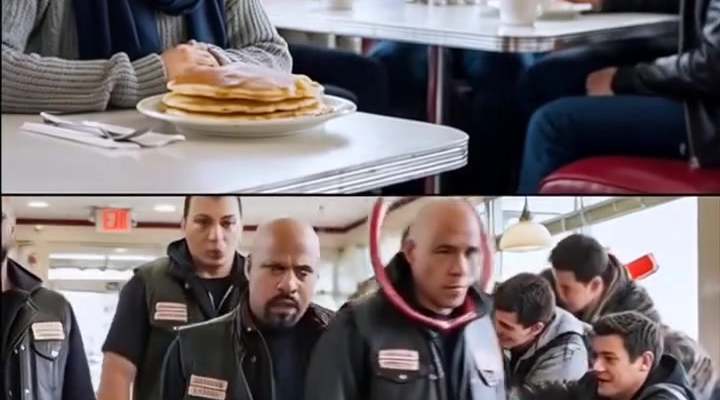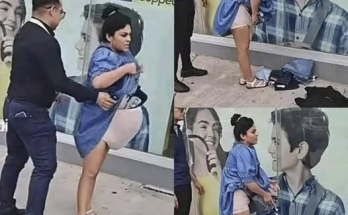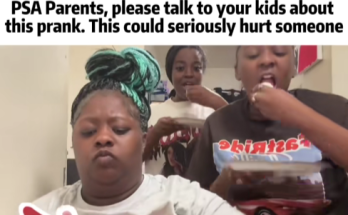Chapter 1: The Door that Always Jingled
The bell above the Maplewood Diner door gave its familiar cheerful jingle as fourteen-year-old Clara Bennett wheeled herself inside. For most people, the sound was ordinary—just a doorbell announcing another hungry customer. But for Clara, it always felt like an announcement that she belonged.
She was used to stares in other places. At the grocery store, people’s eyes sometimes lingered too long on her wheelchair. At the library, she sometimes caught whispers from children her own age who didn’t understand. Curiosity, pity, even discomfort often followed her like a shadow. But here at the Maplewood Diner, those shadows faded away.
“Morning, Clara,” Janet called from behind the counter. Janet had been a waitress at the diner for nearly twenty years, and her smile never failed to soften Clara’s mornings.
“Morning,” Clara replied, steering carefully toward her favorite booth near the big front window. That booth was more than just a table. It was her corner. Sunlight streamed through the glass, warming the cushions. Outside, sycamore trees lined Main Street, their branches swaying gently like dancers. From here, Clara could watch the life of the small town unfold and, at the same time, disappear into her sketchbook.
Because Clara lived more in her sketchbook than in the world around her.
Inside its pages, she built lighthouses perched on cliffs, towering cities of glass, and mountain ranges with snowy peaks. She knew her wheelchair sometimes felt like a cage. But when her pencil moved across the page, it became a pair of wings.
Chapter 2: Pancakes and Sketches
That particular morning, she ordered blueberry pancakes stacked high, with extra syrup, and hot chocolate topped with an impressive swirl of whipped cream. Breakfast at Maplewood was a comfort—one she could count on.
As she waited, Clara leaned over her sketchbook. Her pencil traced jagged cliffs under a tall lighthouse. She shaded the rocks carefully, each line capturing the strength she admired in such places. Lighthouses, she thought, always stood tall in storms. They didn’t run from the waves.
The door jingled again. Clara barely looked up—until the sound of sneakers squeaking across tile made her freeze.
Chapter 3: Cruel Laughter
A group of four boys spilled into the diner. Older than Clara, louder, their voices carried like sirens. She recognized them from high school hallways. They were the kind of boys who always moved through a room as if they owned it.
Blake, the tallest, noticed her first. His grin stretched like oil across water. He jabbed his elbow into his friend Kyle’s ribs, and soon all four turned toward Clara’s booth.
“Well, well,” Blake sneered, his voice cutting across the diner, “if it isn’t Rolling Clara.”
The others burst into laughter. Clara’s pencil stilled above her page. She wished she could sink into the sketchbook, vanish into the lighthouse she had drawn.
Blake leaned close enough for her to smell the gum on his breath. “Bet you need help cutting those pancakes, huh?”
Before she could respond, Kyle swiped her fork and tossed it to the floor. The clatter rang out sharp and cruel. Ryan, another boy, slid her plate away and flipped one pancake onto the tiles. Syrup splattered, pooling beneath the wheels of her chair.
Clara’s face flamed red. She bent forward, trying to reach the fallen fork, but the angle was impossible. “Stop it,” she whispered, her voice trembling.
But the boys didn’t stop. Blake crouched lower, smirking. “What are you gonna do, Clara? Run us over?”
The diner, usually filled with the clink of silverware and friendly chatter, grew tense. Conversations halted. Customers shifted uncomfortably in their seats but avoided eye contact. Janet froze behind the counter, her lips pressed together. The silence was louder than the boys’ laughter.
Humiliation pressed on Clara heavier than the chair she sat in. Tears threatened to spill, but she swallowed them. She had learned long ago not to let them see her cry.
Chapter 4: A Quiet Rescue
Just when she thought no one would help, an older man slid out of a nearby booth. Silver-haired, dressed in suspenders and a neatly pressed shirt, he looked ordinary enough. Yet there was something in the way he walked—steady, unhurried—that commanded respect.
He bent down, picked up her plate, and gently placed it back on the table. His voice was low, but firm enough for the boys to hear. “You didn’t deserve that.”
Then he returned to his seat without another word.
The boys rolled their eyes, muttering under their breath, but they didn’t escalate further. They slouched back to their booth, still smirking, though their cruelty had lost a bit of its shine.
Janet appeared quickly at Clara’s side, replacing her plate with fresh pancakes. “On the house, sweetheart,” she said softly, giving Clara’s shoulder a reassuring squeeze.
Clara tried to smile in thanks, but the taste of pancakes had turned to ash in her mouth.
Chapter 5: Engines in the Distance
Then it came—a sound that rattled the windowpanes. At first faint, like thunder rolling over distant hills. But it grew louder, deeper, until the entire diner seemed to vibrate. Heads turned toward the glass.
Down Main Street came a convoy of motorcycles, a dozen strong. Chrome gleamed in the sun, engines roared in unison, and leather jackets flashed with patches. They pulled into the Maplewood parking lot in perfect formation, their arrival impossible to ignore.
The boys stiffened in their seats. Unease flickered across their faces.
The door creaked open.
Chapter 6: The Biker Family
The leader entered first. Tall, broad-shouldered, with tattoos winding down his arms, he wore a leather vest marked with the insignia of his club. Behind him, men and women filled the doorway. Heavy boots echoed on the tiles, and the diner fell into silence once more.
The leader’s gaze swept the room before landing on Clara. He walked toward her booth, crouching so his eyes met hers. Despite his rugged appearance, his voice was gentle.
“Sweetheart,” he asked, his gravelly tone carrying to every corner of the diner, “who did this to you?”
Clara’s throat tightened. Words failed her. But her eyes flicked—just once—toward the boys’ booth. That was enough.
The leader rose, his presence towering. He turned on the bullies. “A real man doesn’t pick on someone who can’t fight back. You think this makes you strong?” His voice cut through the silence. “It makes you weak.”
The diner held its breath.
Blake’s smirk crumbled. Nervous color flushed his cheeks. One by one, the boys slid from their seats, heads bowed. Without a word, they shuffled toward the door and slipped outside, their earlier bravado gone.
The leader didn’t follow. He didn’t need to. His silence was heavier than any threat.
Chapter 7: Armor in Leather
When the door closed behind the bullies, the tension in the diner broke like a dam. Murmurs rippled through the room. A few customers even clapped softly.
The leader turned back to Clara. “Bring her whatever she wants,” he told Janet. “Put it on our tab.”
Then, without hesitation, he shrugged off his leather jacket. It was patched and worn, clearly loved through years of travel. He draped it gently over Clara’s shoulders. The jacket was enormous on her small frame, but it felt like armor.
“From now on,” he said, his voice softened now, “you’re family.”
Tears welled in Clara’s eyes—not from humiliation this time, but from gratitude. For the first time in a long time, she felt safe.
Chapter 8: Belonging
The bikers filled the diner with warmth and laughter, changing the atmosphere completely. Bear, a huge man with a booming laugh, introduced himself first. Liza, who had once been a schoolteacher, promised to help Clara with homework if she ever needed it. Stitch, the club’s go-to for sewing patches, pulled out a needle and thread right there at the table, showing her how he repaired leather jackets after long rides.
They treated Clara not as fragile, not as different, but as one of them. Someone who belonged.
When the convoy prepared to leave, the leader—his friends called him Ror—knelt once more. “Keep the jacket,” he said. “That patch on the back? It’s more than fabric. It’s a promise. If anyone ever bothers you again, remember—you’ve got us behind you.”
As their engines thundered back to life and rolled down Main Street, Clara clutched the jacket close. For the first time, she didn’t feel small. She didn’t feel invisible. She felt powerful.
Chapter 9: Echoes of Kindness
The days that followed were different. At school, the boys who had mocked her now avoided her gaze. Word of what happened at the diner had spread quickly, carried on the whispers of a small town. Clara no longer faced stares of pity alone. She also received nods of respect.
The Maplewood Diner itself became a little brighter in her eyes. Every jingle of the door now reminded her not just of breakfast, but of the day she discovered family could come in unexpected forms—sometimes roaring in on two wheels.
Reflections: More Than Just a Story
Clara’s story reminds us of something simple yet powerful: kindness echoes louder than cruelty. A diner community, an older man’s quiet courage, and a biker family’s protective strength showed that standing up for what is right can transform someone’s world.
Local diner reviews often talk about pancakes, service, or atmosphere. But sometimes the best review a diner can earn is the way it becomes a place of safety, acceptance, and belonging.
Motorcycle safety equipment is usually discussed in terms of helmets, gloves, and jackets. Yet this story reminds us that the culture surrounding riders can also offer protection—through solidarity, loyalty, and compassion.
Even skincare products, often linked to how we look on the outside, pale compared to the inner glow that comes when someone feels truly seen, respected, and loved.
For Clara, the diner became more than a restaurant. The bikers became more than strangers. And her wheelchair became less of a cage, because her heart had grown wings.
Family isn’t always about blood. Sometimes, it’s about the people who show up when you need them most.
And sometimes, it roars in on two wheels.



